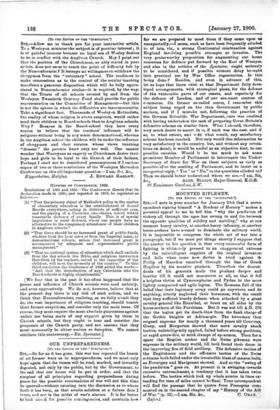MOUNTED RIFLEMEN.
[TO THE EDITOR OF THE "SPECTATOR."] note in your number for January 20th that a corre- spondent signing himself " A Student of History " makes a personal appeal to me to tell him "why the pendulum of victory all through the ages has swung to and fro between the opposite qualities of solidity and mobility," why at one moment heavy cavalry, at another heavy infantry, at another horse-archers have seemed to dominate the military world. It is impossible to compress the whole art of war into a paragraph, but if we must put things shortly I suppose that the answer to his question is that every successful form of fighting is ultimately pressed to an exaggerated extreme by the unintelligent copyists of the original inventor, and fails when some new device is tried against it• Philip of Macedon smashed through the line of Greek Hoplites by his massive phalanx. Therefore the descen- dants of his generals made the phalanx deeper and heavier till it could not manceuvre at all, so that it fell a helpless victim at Cynoscephalae and Pydna to the more lightly compacted and agile legion. The Romans, fall of the belief that their legionary array could go anywhere and do anything, utterly neglected their horsemen, with the result that they suffered bloody defeats when attacked by a great cavalry general like Hannibal, or beset on all sides by the horse-archers of the Parthians. But it was not till A.D. 378 that the legion got its death-blow from the flank charge of the Gothic knights at Adrianople. The horseman then reigned supreme for nearly a thousand years till Courtray, Crecy, and Morgarten showed that mere cavalry shock tactics, unintelligently applied, failed before strong positions, or rapid arrow-fire, or solid clumps of spearmen. Then for a space the English archer and the Swiss pikeman were supreme in the military world, till both found their doom in the improving fire of field artillery. The defensive tactics of the Englishmen and the offensive tactics of the Swiss columns both failed under the irresistible blast of cannon balls, as Formigny and Marignano showed. And so the "swing of the pendulum " goes on. At present it is swinging towards excessive entrenchment, a tendency that it has taken twice before. The tactics which lock up whole armies in lines ex- tending for tens of miles cannot be final. Your correspondent will find the passage that he quotes from Procopius com- mented on in the second chapter of my "History of the Art of War " (p. 32).—I am, Sir, &c., C. OMAN. Oxford.


















































 Previous page
Previous page